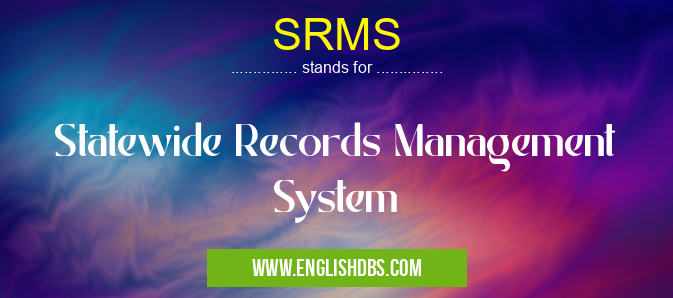What does SRMS mean in MANAGEMENT
SRMS stands for Statewide Records Management System. It is a comprehensive system designed to manage the creation, capture, storage, retrieval, and disposition of records across an entire state or other large-scale organization.

SRMS meaning in Management in Business
SRMS mostly used in an acronym Management in Category Business that means Statewide Records Management System
Shorthand: SRMS,
Full Form: Statewide Records Management System
For more information of "Statewide Records Management System", see the section below.
» Business » Management
Components of SRMS
- Recordkeeping: Provides tools for creating, classifying, and organizing records in a systematic manner.
- Document Management: Manages digital and physical documents, including version control and secure storage.
- Electronic Records Management: Enables the management of electronic records in compliance with legal and regulatory requirements.
- Retention Management: Sets and enforces retention schedules for different types of records, ensuring compliance with records retention policies.
- Disposition Management: Provides a framework for disposing of records in a secure and compliant manner.
Benefits of SRMS
- Improved Record Management: Streamlines record management processes, making it easier to locate and access necessary records.
- Increased Efficiency: Automates tasks and provides real-time visibility into record transactions, saving time and resources.
- Enhanced Security: Protects sensitive records from unauthorized access, ensuring compliance with data protection regulations.
- Reduced Storage Costs: Centralizes and optimizes record storage, eliminating the need for off-site storage facilities.
- Improved Collaboration: Facilitates collaboration among departments and agencies by providing a shared platform for accessing and managing records.
Essential Questions and Answers on Statewide Records Management System in "BUSINESS»MANAGEMENT"
What is SRMS?
SRMS stands for Statewide Records Management System. It is a centralized system used by government agencies to manage and preserve electronic and physical records.
How does SRMS benefit government agencies?
SRMS provides numerous benefits, including:
- Improved recordkeeping efficiency and accessibility
- Enhanced security and preservation of records
- Compliance with legal and regulatory requirements
- Reduced storage costs and space requirements
What types of records can be managed in SRMS?
SRMS can manage a wide range of records, including:
- Electronic documents (e.g., emails, spreadsheets, presentations)
- Physical documents (e.g., paper files, photographs, maps)
- Audio and video recordings
- Social media posts
How does SRMS ensure the security of records?
SRMS employs robust security measures to protect records from unauthorized access, modification, or destruction. These measures include:
- Encryption and access controls
- Regular backups and disaster recovery plans
- Compliance with industry-standard security protocols
How can government agencies access records stored in SRMS?
Agencies can access records through a secure online portal or by submitting requests to the SRMS administrator. Authorized users can view, download, or print records as needed.
What are the costs associated with using SRMS?
The costs of using SRMS vary depending on the size and complexity of the agency's recordkeeping needs. Agencies typically pay an annual subscription fee and may incur additional charges for support and training.
Final Words: SRMS plays a vital role in the efficient management of records at a statewide or large-scale organizational level. By providing a comprehensive suite of tools, it enhances recordkeeping, document management, and compliance, while reducing storage costs and improving collaboration.
SRMS also stands for: |
|
| All stands for SRMS |
